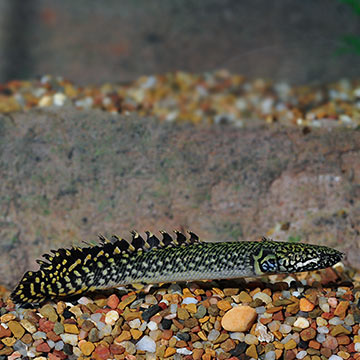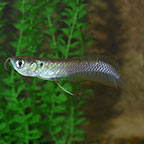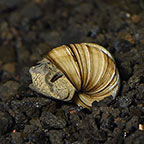
Additional locales and sizes may be available!
Additional locales and sizes may be available! Email me when availableQuick Stats
What do these Quick Stats mean? Click here for more information
What do these Quick Stats mean? Click here for more information
Overview
The Ornate Bichir does best in a large "oddball" aquarium, densely planted with numerous hiding places, and a sandy bottom. This species is semi-aggressive in the fact that they will swallow any fish or invertebrate that they can fit into their mouth. Be careful in choosing passive tank mates for the Bichir, as they are very passive towards other large fish. However, they are aggressive towards their own kind, and only one should be incorporated into an aquarium, unless the aquarium is very large. Prone to jumping, a tight, well-sealed aquarium lid is required.
Eggs are deposited on clumps of vegetation; however, breeding in the hobbyist's aquarium setting is not common.
Approximate Purchase Size: Small: Under 1-1/2"; Medium: 1-1/2" to 2-1/2" Large: 2-1/2" and Larger
Customer Testimonials
I have had an Ornate Bichir for a couple of years now and I would have to say that this is my absolute favorite fish. Some of his tank mates include several different kinds of catfish, Bala Sharks, Jellybean Parrotfish, freshwater flounders, and five turtles. He gets along with everyone extremely well unless they are bite size. Our turtles love him and he doesn't seem to mind their occasionally clumsy behavior. When I purchased him he was about 4 inches in length and now he is about 10 inches long. He is friendly, interesting, and docile. He doesn't hide often and is fun to watch. I would highly recommend an Ornate Bichir to anyone who wants a large fish who is not too aggressive.







